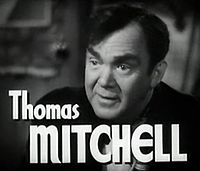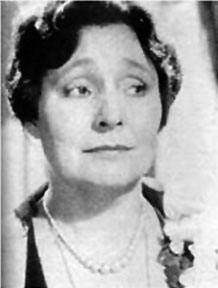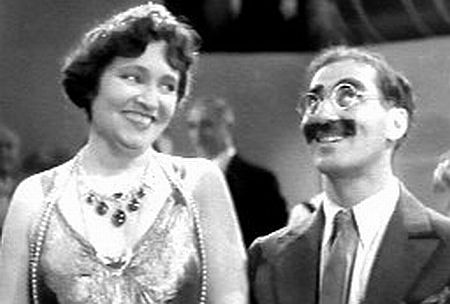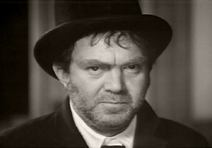
Happy 2009 to all you fans of character actors! My sincere apologies for not updating regularly; the holidays and holiday work got in the way of what I really like to do: watch old movies. My new year's resolution is to update "In Character" more frequently!
Over the holidays I was flipping channels and came across John Ford's "The Quiet Man." I stumbled into the middle of the wedding scene, where Victor McLaglen, Francis Ford, and Ward Bond are all standing side by side. I was, of course, delighted. But it also made me realize that maybe I've spent too much time in the John Ford Stock Company (if such a thing is possible). So today we're expanding to deal with a versatile and hard-working actor who only worked with Ford once. I'm speaking of Thomas Mitchell.
Ford cast Mitchell in his 1939 epic "Stagecoach," as a drunken doctor stumbling towards some kind of salvation. Despite being one of the best actors of the age, Ford never again used Mitchell, perhaps because the actor stood up to his notorious bullying. When Ford attempted to jump on Mitchell about something or other, Mitchell laughed and brushed him off saying "That's okay, I've seen 'Arrowsmith'," one of Ford's notorious flops.
This kind of cavalier rejoinder is something one could easily expect from the mouth of one of Mitchell's characters. A seasoned stage professional, Mitchell was something of a rarity among Hollywood character actors and a forerunner of the modern type: he was a true chameleon who could play the hapless Uncle Billy in "It's a Wonderful Life" just as well as the bitter newspaperman in "Mr. Smith Goes to Washington." He worked four times with Frank Capra, who put him on the cinematic map with a role in "Lost Horizon." He played everything from Columbo to Willy Loman on Broadway, and was the first actor to win the Triple Crown: An Oscar, and Emmy, and a Tony. In short: Thomas Mitchell was a grade-A acting bad-ass.

But today I want to focus on one year in his career: 1939. The golden year of Hollywood Production, it's my vote for the most important year in American cinema. What films did Thomas Mitchell appear in in 1939? He was in five films: 1. The movie that redefined the Western genre ("Stagecoach,"); 2. The film that gave Cary Grant his best dramatic role ("Only Angels Have Wings"); 3. A defining work for Capra, Jimmy Stewart, and America ("Mr. Smith Goes to Washington"); 4. An epic historic tale ("The Hunchback of Notre Dame"); 5. The most successful film of all time ("Gone With the Wind"). I can think of no other actor who had such prominence in this, the greatest of American cinematic years.
We've already discussed "Stagecoach" briefly; for the record, it should be noted that while Mitchell had his disagreements with John Ford and his treatment of actors, he went on the record to say that he'd act for him again, anytime, anyplace. As a free agent (meaning he wasn't contracted to any one studio), Mitchell would have had the freedom to do so, if only the intransigent Ford had come calling. Below at 1min in, he engages in a bit of silent pantomime while the world-class blusterer Berton Churchill pontificates:
In "Only Angels Have Wings," Howard Hawks created his most archetypal presentation of men together in comraderie, and the women who love them. Mitchell was cast excellently as Kid Dabb, Cary Grant's best friend and a tough flyer who is forced to retire when his eyesight goes. Mitchell takes it hard and gives a great performance that treads the line between machismo and comedy, while also holding his own against Cary Grant (not an easy thing for anyone to do).
Following his success with Mitchell in "Lost Horizon," Capra cast him again in "Mr. Smith Goes to Washington," as a boozy DC reporter whose tough exterior masks a long-held torch for Jean Arthur. Mitchell is a standout in two scenes; in the first he takes apart young Stewart's naivete by cruelly explaining to him how things really work. He's so persuasive it makes you wish he had played a true villain. But I even prefer the drunken scene where he proposes marriage to Jean Arthur; he plays it off like it's no big deal, but you can see his heart is yearning for her. In a film full of (deserved) broad strokes, it's a marvelous bit of subtlety. Sadly, I couldn't find a clip of this scene online, so you'll have to be content with this wonderful old trailer:
He has a smaller role in "The Hunchback of Notre Dame," as Clopin, the king of thieves. With his roguish Irish face, he seems a poor choice to play a hotheaded leader of French gypsies, but Mitchell proves himself game for anything. He has a constant twinkle in his eyes that indicates both warmth and the face that he cannot be trusted (catch his entrance below at :45 sec in)
And finally, "Gone With the Wind." Granted, not all of these films were shot at the same time, but Mitchell's work ethic is astonishing by any stretch of the imagination. In GWTW, he plays Gerard O'Hara, Scarlet's father and the Irish head of the family quickly driven to insanity by the sacking of the South and the destruction of Tara. By all accounts, the production of GWTW was an endless process, with David O. Selznick demanding constant retakes and rewrites, driving two directors to nervous breakdowns in the process. Mitchell seems to have emerged relatively unscathed from this process, and makes the most of his small part. He's a big part of the opening of film, establishing the storybook Irish plantation feel that makes the destruction of the second half so heartbreaking.
As you can figure out, I hope to write much more about Thomas Mitchell in the coming months. He was a big part of some of the biggest films ever made, and I clearly can't say enough about him. To leave you now, here's a clip from the bizarre 1954 game show where celebrity guests meet regular people who have the same name of them (it doesn't make any sense to me). Enjoy Thomas Mitchell bantering with the host and enjoy 2009!
P.S. Don't think that Mitchell is out of it for now knowing the name of the movie he's promoting -- actors were often the last person informed of the studio's many name changes and edits. It was eventually called "Secret of the Incas."
Suggested Viewing:
-Stagecoach
-Only Angels Have Wings
-Mr. Smith Goes to Washington
-The Hunchback of Notre Dame
-Gone With the Wind






